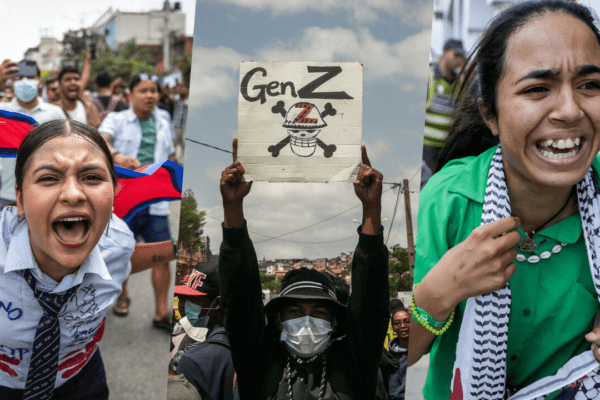For nearly three decades, Radio Free Asia has provided critical Tibet coverage, serving as an information lifeline for Tibetan audiences living under China’s authoritarian rule and connecting them to Tibetans in exile – and all the while offering a rare window into life in the highly restricted region. Through shortwave radio and digital platforms, RFA Tibetan has reported epochal moments in the history of modern Tibet. It recorded first-hand accounts of the widespread protests in Tibet in 2008 and the subsequent wave of self-immolations. RFA documented the Dalai Lama’s historic voluntary devolution of his temporal powers in 2011 and transfer of it to the democratically elected leader of Tibet’s exile government, or the Central Tibetan Administration. Audiences in Tibet have secretly accessed RFA broadcasts at great peril to their own lives. They have contended with China’s sophisticated censorship apparatus, deliberate signal jamming, and the risk of prison. A teacher helps a student to write the alphabet in a first-grade class at the Shangri-La Key Boarding School during a media-organized tour in Dabpa county, Kardze Prefecture, Sichuan province, China, Sept. 5, 2023.(Andy Wong/AP) Religious and linguistic persecution in Tibet RFA has meticulously documented China’s systematic efforts to erode Tibetan cultural identity, where children and monks as young as five are being removed from Tibetan-language schools and are forcefully admitted in Chinese boarding schools. RFA journalists have revealed how new educational policies mandating Mandarin as the primary language of instruction have effectively marginalized the Tibetan language in Tibet. RFA has exposed the Chinese government’s intensifying control over Tibetan monasteries through new administrative regulations and forced closures. RFA has detailed China’s efforts to accelerate the Sinicization of Tibetan Buddhism, where monastic education requires “patriotic education” and legal study. Population caps in Buddhist academies such as Larung Gar have forced thousands of monks and nuns to disrobe, and admission criteria now include loyalty tests to the Chinese Communist Party. RFA reports have revealed the government’s strategy of controlling religious institutions from within while publicly claiming religious freedom. Tsezung Kyab, 27, self-immolates on Feb. 25, 2013, at Shitsang Monastery in Luchu region of eastern Tibet.(RFA Tibetan) Beginning in 2009, RFA also documented a wave of self-immolations across Tibet, with the first monk setting himself alight in February 2009, followed by a dramatic escalation after 2011. To date, over 157 self-immolations have been confirmed inside Tibet and in exile communities, with RFA carefully verifying each case. This reporting has preserved the final statements of many self-immolators, revealing their consistent demands for freedom, the return of the Dalai Lama to Tibet, and an end to Chinese repression. These acts of ultimate protest involved Tibetans from all walks of life—monks, nuns, students, nomads, farmers, and parents—ranging from teenagers to people in their 80s, though the majority were young monks between 18-30 years old. During the COVID-19 pandemic, RFA provided rare insights into the situation inside Tibet, reporting on lockdown conditions and government prioritization of political stability over public health. RFA coverage of the 2008 Sichuan earthquake, as well as the recent 2025 Dingri earthquake, highlighted both the devastation in Tibetan areas, challenged Chinese government narratives, and shed light on the remarkable community-led voluntary response that outpaced official relief efforts. Video: Former Atsok monastery site completely submergedEnvironmental and human impact of unchecked development RFA’s investigative reporting has exposed the environmental and cultural devastation resulting from China’s aggressive development policies in Tibet, including the submersion of the historic Atsok Monastery due to a dam expansion. RFA also broke the story of the recent Dege protests in 2024, where hundreds demonstrated against the planned construction of a massive dam on the Drichu River that would submerge at least six ancient monasteries and force the relocation of at least two villages. RFA revealed how Chinese authorities arrested hundreds of protesters in February 2024, including monks and local residents, with many facing beatings and interrogation. Video: A timeline of the Dege protests against the proposed dam constructionRFA has revealed the devastating impact of mining on Tibet’s fragile ecosystem and the local communities dependent on these resources. The coverage of China’s massive forced resettlement programs has shown how more than two million Tibetan nomads have been forcibly relocated from their ancestral grasslands into urban settlements, destroying traditional sustainable livelihoods and creating new social problems while clearing land for resource extraction. Video: Tibetans in 26 countries vote for leader of exiled governmentDemocratic government-in-exile RFA has chronicled the remarkable development of Tibetan democracy-in-exile, from the first direct elections of the Kalon Tripa to the most recent 2021 elections for Sikyong – the political leader of the Central Tibetan Administration. Following the Dalai Lama’s devolution of political power in 2011, RFA documented the historic first democratic transfer of leadership to Harvard-educated legal scholar Lobsang Sangay, who served two terms. RFA reporting on the 2021 elections captured the vibrant democratic process that elevated Penpa Tsering to the Sikyong position, highlighting candidate debates, unprecedented voter participation across the global diaspora, and the peaceful transition of power. RFA also provided in-depth reporting on Sino-Tibet talks that sought to negotiate prospects of “genuine” autonomy for Tibet under China as per the Central Tibetan Administration’s Middle Way Approach – which urges greater cultural and religious freedoms guaranteed for ethnic minorities under provisions of China’s constitution. Nine rounds of formal discussions later, the talks ground to a halt in 2010 after China rejected the proposals although there was no call from the Tibetan side for independence. Foreign governments, including the U.S., have urged Beijing to resume dialogue without preconditions. Video: Last surviving CIA officer trained Tibetan fighters at Camp HaleStories of Tibetan resilience, defiance, and hope Throughout it all, RFA has highlighted stories of Tibetan resilience, resistance, and achievement. RFA has profiled artists preserving traditional music despite restrictions on cultural expression; young entrepreneurs building sustainable businesses that honor Tibetan craftsmanship; athletes overcoming political obstacles to compete internationally, and scholars working diligently to digitize ancient texts at risk of being lost forever. RFA’s coverage has celebrated the Tibetan spirit and determination to thrive…







